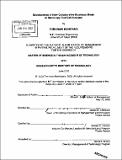Development of new collaborative business model in stationary fuel cell industry
Author(s)
Komiyama, Tomonari, 1969-
DownloadFull printable version (7.092Mb)
Other Contributors
Massachusetts Institute of Technology. Management of Technology Program.
Advisor
James M. Utterback.
Terms of use
Metadata
Show full item recordAbstract
The stationary fuel cell industry is currently witnessing an unstable period because of current technology barriers and business barriers at the same time that society has high expectations for fuel cell technology to solve current environmental problems. In order to overcome these barriers as well as to accelerate the commercialization of the stationary fuel cell business, companies in the industry must consider their long-term business development models based on a deeper understanding of their present business and technology positions as well as incumbents' rivalry technologies. This thesis identifies significant barriers for the early commercialization of stationary fuel cells in the U.S. and Japan through interviews with ten business experts in the industry. The concepts of dominant design, disruptive technology and public-private consortium are than analyzed in the context of the stationary fuel cell industry. Finally, future collaborative business development models for each stationary fuel cell industry in the U.S. and Japan are proposed based on the interview data and research analysis. The largest technology barriers and business barriers in both countries are, respectively, durability and high cost. On the other hand, the U.S. and Japanese perceptions of dominant design, disruptive technology and public-private consortium differ. The U.S. industry expects that a dominant design and public-private consortium will materialize although two interviewees responded that it is still too early for a dominant design and a consortium to enable invention and innovation. The Japanese industry is reluctant to adopt the dominant design and the public-private consortium. It would prefer a conference held for only private companies to share information and knowledge. In terms of disruptive technology, the U.S. industry thinks that external factors such as energy security issues and global warming will make stationary fuel cells become a disruptive technology. In Japan, however, industry participants believe that internal factors such as the mass production of fuel cell vehicles and deregulation in the retail electricity market will make stationary fuel cells become a disruptive technology. In order to realize and accelerate the stationary fuel cell business, industry must consider both cooperation and competition strategy in the long-term since it confronts not only high barriers that need a long time to be solved but also since it requires promising technology breakthroughs for successful commercialization.
Description
Thesis (S.M.M.O.T.)--Massachusetts Institute of Technology, Sloan School of Management, Management of Technology Program, 2002. Includes bibliographical references (leaves 99-100).
Date issued
2002Department
Management of Technology Program.; Sloan School of ManagementPublisher
Massachusetts Institute of Technology
Keywords
Management of Technology Program.